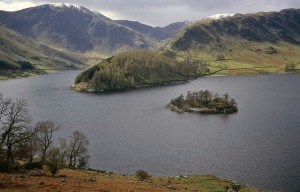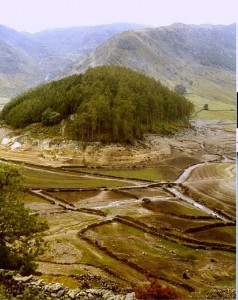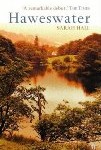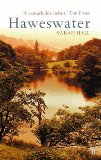Winner of the 2003 Commonwealth Writers’ Prize First Book Award and 2003 Betty Trask Award
I spent my teenage years living in the Lake District and so I have a soft spot for anything set in Cumbria. Haweswater is one of many lakes in the Lake District, but unlike the majority it is man-made; created by the construction of a dam and the subsequent flooding of the valley in the 1930s. Haweswater gives a moving account of how the remote farming community came to terms with the fact that their village was going to be destroyed and describes their final months as they prepare to leave a home that has been theirs for generations.

Haweswater had an extra impact on me as I visited the village of Mardale when it was revealed during a drought. The photo above shows a typical view of Haweswater as it is today; whilst the one below shows a similar view during a drought – with the roads, demolished houses and farm walls revealed.

I loved the Cumbrian dialect in this book. You don’t hear it on television very often and I think it is the first time I have read a book containing it.
Teddy’s gone fer Frithy. Nowt else to dyah but wait. Thowt aboot garn misell, Sam. Twa arms better un yan, eh? Even auld bugger like misell?
When I first moved to Cumbria I couldn’t understand a word the locals were saying and I suspect that many readers will struggle to understand the dialect in this book. The good news is that the majority of the novel is written in beautiful, descriptive prose and so you will still understand everything that is happening even if you don’t catch what they are saying!
For the last three hundred years or more there often could be seen a man or a child pausing on the bridge to look below at the water, idling in conversation with a companion, or as a solitary, watching the trout rise and flick between the reeds under the bridge. Casting an eye over the river, as if for no other reason than there was water flowing past.
Despite the fact that you know what happens in the end, this is a fantastic story. The characters are very well developed and I felt a strong emotional connection to them. A dark sense of foreboding builds as the novel progresses and the ending is heartbreaking. This is a beautiful portrait of a lost community.
I’m slightly biased, but I highly recommend that you read it.
Have you read any books set in the Lake District?


43 replies on “Haweswater – Sarah Hall”
I read Hall’s latest book this year and absolutely loved it – I think her writing is so gorgeous and descriptive that it wouldn’t matter what the subject matter of her books were for me!
Karen, I loved How to Paint a Dead Man too! I don’t normally enjoy books about art, but I think you are right – Sarah Hall could write about paint drying and I’d love it!
I read this while I was in the lakes this summer – it was wonderful! I hadn’t actually connected it with How to paint a dead man (silly me!) which I also enjoyed this year. Looking forward to more from Sarah Hall, she writes so well.
PS: The only lake district books I can think of are childrens ones I’m afraid.
Verity, You chose the perfect place to read it! Sarah Hall has written 5 books and I’m really looking forward to reading the rest, but she is one of those authors who I want to savour each book and ensure I read them slowly.
I haven’t read anything yet by Sarah Hall but have heard lots of wonderful things about her writing. There is something rather melancholic and romantic about villages that have been flooded (although I’m sure it must have been heartbreaking for the people who had to leave their homes). I think Dorothy L. Sayers mentions a similar event in one of her books (The Nine Tailors, if I remember correctly). I read it over fifteen years ago but still remember it.
Sakura, There is something about homes underwater which seems much sadder than homes destroyed by fire or earhquake etc. Perhaps it is the planning of it?
Thanks for pointing out the Dorothy Sayers book. I have been meaning to read one of hers so Nine Tailors sounds like a good place to start.
The photographs are pretty striking. How odd to see the flooded houses and roads revealed. Anyway, sounds like a book I should add to my wish list — I am not bothered by dialect and I like the premise of the story.
Beth, I’m sure that you’d enjoy it. I hope you decide to read it at some point 🙂
Those pictures turn my blood cold! It is like viewing a once-hidden corpse. As far as the dialect, I had a hard time with the bit of it that you shared, but I suspect I would get used to it.
Sandy, I know! That is why I wanted to include the photos – they make it all seem so real and give you a feel for the heartbreaking story. 🙁
Great review, Jackie. As you know, I also loved this book. It must have been amazing to visit the area during a drought — the photos alone are amazing. I could “feel” the impact on the community as I read the book, but as you said in the above comment the photos make it much more real.
Laura, I think that knowing the area makes the book have an even greater impact. It is quite remote and a lot of aspects of their lifestyles are the same today. I can picture some of the people I knew when I lived there as I was reading it. So sad.
I shall definitely be on the lookout for this novel. Its main idea is a haunting one. We have a huge manmade lake in Washington State (Roosevelt Lake, from Grand Coulee Dam) but there isn’t a lost village.
Peter Robinson and another crime writer (mind blank) did books with a similar setup a few years back.
Lynne, I’ve just looked it up and the Peter Robinson novel is called In A Dry Season. I haven’t read any Robinson before, but I love the sound of the Yorkshire settings. I think I’ll give him a try, but I’m afraid I like to start with the first in the series so it might take me a while to make it to In a Dry Season. 🙂
I’ve read A Dry Season, Jackie and Lynne. I like Peter Robinsons books as they are set in Yorkshire where I’m from. You don’t need to read them in order, Jackie; I have read quite a few of his and they have all been out of order.
The Book Whisperer,
‘You don’t need to read them in order’
I’ve heard that before….I’m not sure I believe you….I’m sure you thought it was OK to read The Snowman first. I’m not taking any risks 😉
No risks, eh? I have read Peter Robinson out of order but there are ongoing matters that would bother someone who reads books only in order.
Then again, I’m naught to go by because I read Pat Barker’s Regeneration trilogy backwards and still loved it.
Lynne, I knew there would be ongoing matters 😉 There is no way I’d read a series in the wrong order, but I can see that it would still be enjoyable if the author was good enough. I’m afraid I am one of those people who is really bothered by it so I’ll seek out the first one 🙂
Of course this kind of thing happened in the US as well, but I have never seen such a picture before. How fascinating, like uncovering Atlantis.
Thomas at My Porch, I’m pleased that you found it interesting 🙂
Wow, that dialect seems impossible, but if it’s not the whole book I suppose it should be manageable. Sounds like a really interesting topic for sure.
Amy, Yes. I don’t think it is one that you’ll pick up as you go along either – too many new words. It took me several years to learn their language 😉
This sounds lovely and I love the photos…
Patty, Thanks 🙂
We have a similar situation in Sri Lanka where a village was flooded to make way for a dam and during drought the whole village reappears !
This book sounds very good especially when its applicable to a region the book must be very rich in detail about the geography and people.
Mystica, It is a bit weird to see the village reappear – perhaps you’ll take some pictures of your reappearing village next time it is visible?
I was in Cumbria only 2 weeks ago, Jackie, and I spotted this book in a little bookshop and almost bought it – I really wish I had now!
Living in Yorkshire means that I can get to the Lakes fairly quickly and we often go up there for the weekend – it is one of my favourite places in the whole world. Where abouts did you live up there?
I don’t think I know any more books set in the Lakes other than a murder mystery by Val McDermid called Grave Tattoo. If you can recommend any more I’d love to hear 🙂
The Book Whisperer, Oh no! Sorry to hear you missed out on the book. I hope that you find another copy at some point.
I used to live in the north Lakes, in a village near Cockermouth. Cockermouth was under water last year so it briefly experinced the same thing as Haweswater 🙁
I’m afraid I haven’t read any other books set in the Lake District, but I’m keeping my eyes open for them 🙂
I’m not sure I’ve ever read anything set in the Lake District, but I do not exactly and completely know that I would notice if a book were set in the Lake District. I have heard of it, but its boundaries are not clear to me.
Jenny, The Lake District is quite a small area in North West England and I guess the only way you’d really know a book was set there would be the mention of the lakes/mountains, but I don’t think it is a common setting for books as I haven’t read any others.
Haweswater is such a gorgeous lake. This book sounds like something i would enjoy. That’s a beautiful cover.
Violet, The cover is so atmospheric – I think it is a perfect representation of the book 🙂 I hope you decide to pick it up one day.
[…] Haweswater – Sarah Hall […]
I passed the lake District for the first time last year, on my way to Scotland, and stopped in Grasmere, to get some of the “best gingerbread in the world” (it WAS good). It’s also where you’ll find Wordsworth grave.
This book seems right up my alley. Did the community relocate to the same place? In Portugal there was similar case, but they built a whole new village from scratch
Alex, Grasmere gingerbread does have a very big reputation. I’m not a big fan of gingerbread, but my family always used to stock up whenever they were passing – the smell of that little shop is amazing though 🙂
I’m not sure about where the community went. They didn’t build a new village for them – I think they were all went their separate ways 🙁
I’m fascinated by this as well — I think it’s so amazing that this is done and am sad for the villagers. Might have to track this one down.
Coffee and a Book Chick, I really hope that you decide to pick this one up. It is sad, but so beautiful…..
[…] Haweswater (Sarah Hall) – Thanks to Jackie of Farm Lane Books Blog’s review. […]
I’d probably struggle with the dialect but it sounds like the descriptions would carry me through.
Kathleen, The dialect doesn’t dominate the text so I’m sure you’d be fine. I hope you give it a chance 🙂
It sounds fantastic. I absolutely loved How To Paint A Dead Man, and I bought a copy of The Electric Michelangelo soon after I’d finished HTPADM. Still to read that though…
I also do want to find out how I’d get on with the dialect – I normally do like an element of dialect, but get flustered if there’s too much, so… Anyhooo, glad you enjoyed it.
anothercookiecrumbles, I think I now own all of Sarah Hall’s books. I’m spreading them out as I don’t want to finish them too quickly, but I think they will all be equally wonderful 🙂
[…] Haweswater is one of my favourite books so I was looking forward to reading this one. Sarah Hall perfectly captures the atmosphere of the Lake District and this book is no exception – the beauty of the hills and lakes shines through. Unfortunately other details of this book failed to engage me. […]